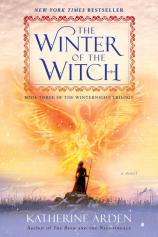The Winter of the Witch
Review
The Winter of the Witch
To be perfectly honest, I’m not really much of a fantasy reader. But when many people I know had read and raved about Katherine Arden’s first novel, THE BEAR AND THE NIGHTINGALE, my interest was piqued. A historical fantasy grounded in real Russian folklore and medieval history, with a strong, complicated female protagonist at its center, sounded like the kind of fantasy I could get behind. And I’m so glad I did, as this trilogy has been among my favorite books of recent years. So it was with a mixture of anticipation and sadness that I opened the concluding volume, THE WINTER OF THE WITCH.
The Russia that Arden has reimagined is one poised to evolve. On the one hand are the chyerti, or demons --- the figures of Russian folklore and legend who have governed ordinary people’s lives for centuries, even living in their homes and hearths as sort of family protectors, or domovoi. On the other hand, however, and growing in strength is the Russian Orthodox church, whose representatives decry the superstitious practices of those who revere chyerti.
"Arden’s magical elements...help raise the stakes of this battle even higher, making for a truly exciting and satisfying ending to this epic trilogy."
And at the center is Vasilisa Petrovna, a young woman who has been raised in a home with domovoi and who believes in --- and fears and respects --- the powerful demon brothers known as Medved (the Bear) and Morozko (the frost demon). In the trilogy’s earlier volumes, she also finds herself torn between different choices --- marriage to a man she does not love or an austere, sequestered life apart from society --- neither of which seems like an attractive option to her. Her bold decision to forge her own path of independence and bravery has caused her to be labeled a witch. As THE WINTER OF THE WITCH opens, her longtime adversary Father Konstantin (who loathes and lusts after her in equal measure) has fomented public fear and suspicion, hoping that by destroying Vasya, he can cement his own power and the love of the people.
But Vasya, remembering Morozko’s words --- “Magic is forgetting the world was ever other than as you willed it” --- musters her own magic to avoid certain death. She escapes into a world where it is always midnight, and where she must rely entirely on her own intellect and instincts to heal, find her way back to herself, and figure out what path to take next. Along the way, she is visited by both Medved and Morozko, who have vastly different ideas about whether and how to work with people in this changing world. Medved says to her, “My brother thinks that men and chyerti can share this world. These same men that are spreading like sickness, rattling their church-bells, forgetting us. My brother is a fool. If men are unchecked, one day there will be no chyerti, no road through Midnight, no wonder in the world at all.” Ultimately, Vasya wonders if there might be some way to bring the two feuding brothers together, to form an alliance that might usher Russia into its modern future, without entirely abandoning its rich and magical past.
Arden clearly has real knowledge of and affection for Russian history, culture and folklore (not to mention horses!). Her novel includes folklore figures whose names will be familiar to modern readers --- Baba Yaga, the Firebird --- and others who might be new to many, such as the upyr, a sort of Slavic vampire. Although freely admitting that her version of history is an alternative one, she grounds her story in actual events, especially the culminating Battle of Kulikovo, in which the real-life Prince Dmitrii Ivanovich led a combined Russian force against a foreign adversary, which (Arden explains in her afterword) helped create the beginnings of Russian unity and national identity. Arden’s magical elements, however, help raise the stakes of this battle even higher, making for a truly exciting and satisfying ending to this epic trilogy.
Reviewed by Norah Piehl on January 18, 2019
The Winter of the Witch
- Publication Date: October 1, 2019
- Genres: Fantasy, Fiction, Historical Fantasy, Historical Fiction
- Paperback: 400 pages
- Publisher: Del Rey
- ISBN-10: 1101886013
- ISBN-13: 9781101886014




